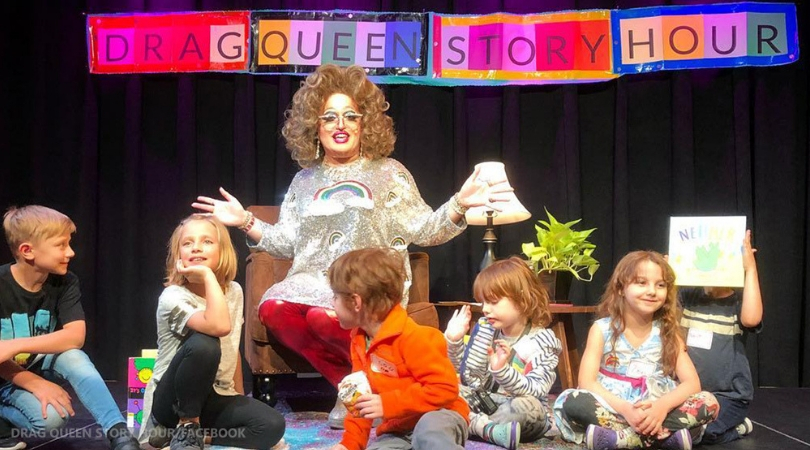How (Public) Libraries Are Being Used to Corrupt Children, by Sarah Quale

Murder Disguised as Care, by Obianuju Ekeocha
June 24, 2019
Explosive Dossier: Cardinal Cupich Under Investigation for Withholding Bernardin Documents, by Marco Tosatti
June 24, 2019
By Sarah Quale, Church Militant, June 24, 2019
The rise of Drag Queen Story Hours, and how you can fight back
Drag queen story hours are popping up in libraries across the country. Are they isolated events or part of a larger, intentional movement to destroy God’s design for the human person? A small library in a southern Maryland town provides some insight into how this battle has advanced, who’s behind it, how it’s funded and what local communities can do to effectively respond.
God’s Design: A Wholistic View of Personhood
Underneath what the pro-life movement calls “the culture of death” is a dark, tangled mess of spiritual brokenness. The symptoms of this brokenness — whether they present as abortion, euthanasia, fractured families, human trafficking, pornography, homosexuality or gender dysphoria — reveal to us the presence of a much larger sickness and a much bigger target. They show us the tragic consequences of sin and of rejecting God’s design for the human person. To destroy the human made in the image of God — to destroy inherent value, dignity and thus, personhood — the Enemy must systematically dismantle each of God’s design elements — life, marriage, family, sexuality and gender (Genesis 1:26–28). What we are witnessing everywhere in our culture today is a direct assault on these elements.
Underneath what the pro-life movement calls ‘the culture of death’ is a dark, tangled mess of spiritual brokenness.
Much of this destructive work has been accomplished over the last century in America, but the goal of the new sexual revolution raging around us today is to finish the job. This battle has erupted in a rather unlikely place, at least for those who still view America’s traditional institutions with hope and nostalgia. A small library in a southern Maryland town provides some insight into how this battle has advanced, who’s behind it, how it’s funded and what local communities can do to effectively respond.
Please sign our petition with LifeSite News to take the first step.
Discovery and Exposure
The Lexington Park Library in St. Mary’s County, Maryland, first came under fire in March of 2017 when local homeschool mom, Georgia Kijesky, discovered that several libraries were planning to host a graphic sex-ed workshop for 12–17-year-old children. The workshop was co-sponsored by the libraries and the Southern Maryland Area Secular Humanists (SMASH). It was promoted as strictly kids-only and led by Bianca Palmisano, a Planned Parenthood-certified sex educator, author of Safer Sex for Trans Bodies and founder of Intimate Health Consulting.
As a result of Kijesky’s efforts to expose the workshop and pressure the county commissioning boards, the St. Mary’s County Library Board of Trustees cancelled the workshop at Lexington Park and issued a press release. However, SMASH later revived the effort, and the workshop was held without official library sponsorship.

https://youtu.be/5_pL1g_MBPA
Fast forward to September 2017, when Kijesky discovered the sexually explicit instruction manual, The Little Black Book for Girlz: A Book on Healthy Sexuality, presented alongside similar books in Lexington Park’s teen section. The display was part of Banned Books Week — an annual event organized by the American Library Association to combat censorship. Kijesky again took her concerns to a St. Mary’s County Board of Commissioners public forum, which triggered a larger effort to change the way the library board of trustees is governed and held accountable to the taxpayers. More on that later.
A few years before Kijesky’s exposure of her local library’s involvement in LGBTQ activism, San Francisco was birthing a new phenomenon that she would eventually come face to face with: the drag queen story hour (DQSH).
According to Drag Queen Story Hour, the non-profit group that jumpstarted the initiative, bringing costumed drag queens into libraries to read to young children and their parents “captures the imagination and play of the gender fluidity of childhood and gives kids glamorous, positive, and unabashedly queer role models.” DQSHs have expanded into Drag 101 — workshops that “demonstrate the art of creating a character, costuming and applying makeup” to tweens and teens. As the movement has grown, serious controversy has erupted in small-town America.
The Backlash and the Money Trails
Sex offender Alberto Garza/Tatiana Mala-Niña, convicted for assaulting an 8-yr-old boy
DQSHs and Drag 101 events have seen a sustained backlash of petitions and protests from Christian communities, resulting in cancellations in several states, including Ohio, South Carolina, Louisiana and Kentucky. The events have sometimes served as doorways for sex offenders to gain access to children, made evident by recent reports in Texas and Ohio, where library board officials revealed there were no background checks in place to vet any of the performers.
Sex offender William Travis Dees/Liza Lott,
labeled “high risk” for assaulting four children
aged 4, 5, 6 and 8






